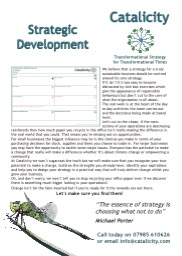Strategic Development
Every business has a strategy, whether it is a formal written document or a verbal plan agreed between partners. Defining a strategy that is fit for a long term future is increasingly challenging given the broad range of global issues that can affect your plans; particularly as we begin to negotiate our blueprint for a new relationship with the EU. Ensuring that your corporate responsibility objectives are key to your strategy, and not just another team working in a silo, adds another dimension to the complexity.
Truly forward thinking businesses are adapting the way they do business, in many cases taking a whole new direction with their core activities when impacts are identified that harm the environment, damage communities or provide poor conditions for their employees.
This can be difficult when your business is built on a history that you are proud of, using preferred methods that are long standing. Taking an objective view from within the organisation is not easy and takes courage as the findings may conflict with existing culture that uses processes and systems that are deeply embedded into the way you do things.
However the most beneficial endeavours do not come easily. Building a business that is sustainable in the long term enables you to care about this planet, our home, the communities you operate in and depend on for staff and customers, but the benefits to your long term resilience go far beyond the financial business case.
Imagine your business with a carefully selected supply chain that does no harm from source to sale and beyond. Picture a team of colleagues who are proud to come to work and know their ideas are embraced and nurtured. Your customer base chooses to buy from you in the knowledge that not only do you provide excellent quality and customer service but they are also buying a sustainable product. Whether you are a small business planning for growth, or a large organisation ready for a different path, all this is possible with a shift away from basic environmental management to strategic change.
The first step is to decide that you want to commit to making change happen. The second step is a call to us to discuss your aspirations so we can start working together to plan to put your programme into action!
With well facilitated gathering of facts, external viewpoints that challenge your status quo and a structured method for engaging with your organisation and enabling your colleagues to contribute effectively, you can begin to break new ground and develop your business and your team for a stronger future.


